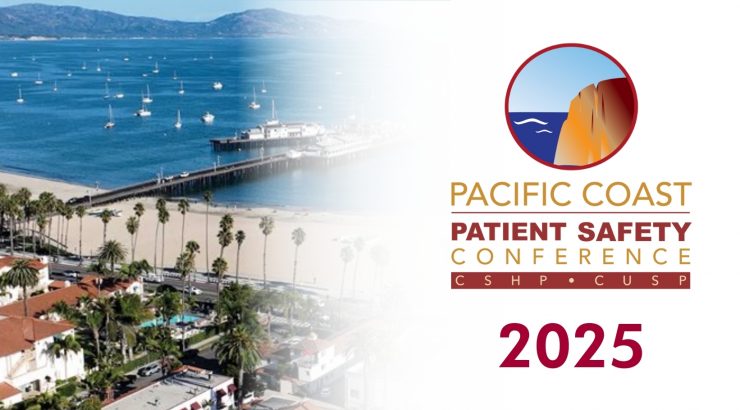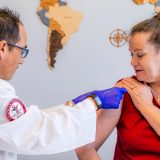Preventable Harm and the Path Forward: Experts Weigh In at the Pacific Coast Patient Safety Conference
March 5, 2025
The 5th Annual Pacific Coast Patient Safety Conference (PCPSC) brought together healthcare professionals, patient safety officers, and academic leaders for in-depth discussions on advancing patient safety and optimizing medication safety protocols. Co-hosted by Chapman University and the California Society of Health-System Pharmacists (CSHP), this year’s conference provided an advanced platform for interdisciplinary dialogue on clinical risk mitigation, healthcare quality improvement, and regulatory implications.
Convergence of Experts Driving Systemic Change
As a specialized boutique conference, PCPSC caters to professionals embedded or interested in pioneering patient safety initiatives, including pharmacists, pharmacy technicians, physicians, nurses, and safety officers. Attendees engaged in continuing education (CE) programming, peer-reviewed case studies, and interactive policy discussions, all centered around integrating evidence-based safety measures into practice.
“Preventable harm is a critical issue, where people are dying more to poor healthcare care than inaccess to healthcare. Healthcare environments remain high-risk, and providers often are wary of institutional retaliation when advocating for patient safety in reaction to a problem,” stated Martin Hatlie, J.D., President & CEO of Project Patient Care and former medical liability defense attorney, in his opening keynote. Hatlie addressed the lack of patient safety prioritization in national policy, emphasizing the need for Patient Safety Scores—a structured accountability measure obligating hospital leadership to proactively address preventable harm rather than passively meeting compliance benchmarks.
Helen Macfie, Pharm.D., retired Chief Transformation Officer for MemorialCare Health System and one of Becker’s Healthcare Top Patient Safety Experts, provided a firsthand account of the real-world impact of preventable medical errors. After losing her father to a patient safety surgical error, Macfie shared her story of how she was further galvanized as an existing healthcare professional to take patient safety even more seriously. “Patient safety cannot be reduced to a procedural checklist. A deeper, systems-based approach is necessary for risk mitigation,” she said, citing statistical data indicating a 25% likelihood of patient harm during a healthcare encounter over a patient’s lifetime, with a 12.5% probability of severe adverse events, a figure reported by the Health Foundation.
Key Discussions: Data Analytics, Equity, and Systemic Risk Reduction
This year’s sessions emphasized the role of predictive analytics, machine learning, and data-driven risk stratification in improving safety outcomes. Robin Betts, R.N., Vice President of Safety, Quality & Regulatory Services for Kaiser Permanente Northern California, outlined a 5-stage equity-centered implementation pipeline, illustrating how disparity analytics can pinpoint demographic-based variability in clinical outcomes. Betts included a recent study that detected disproportionate access delays in emergency care among Asian American populations, which cascaded into the impact of structured data analysis in risk detection.
The closing keynote was delivered by Rita Jew, Pharm.D., President of the Institute for Safe Medication Practices, who focused on closing gaps in practice areas and best practices to facilitate change in health-systems.
Technical Sessions and CE Opportunities
In addition to high-level policy discussions, PCPSC 2025 featured specialized technical sessions with applied strategies for improving patient safety infrastructure. Highlights included:
- “Low-Dose Aspirin for Preeclampsia Prevention: The Crucial Role of Pharmacists” by Sarah Vaillancourt, D.N.P., covering the latest USPSTF recommendations, risk stratification algorithms, and pharmacotherapeutic considerations in obstetric care.
- “Another Piece of the Cost Puzzle: Reducing Waste and Advancing Safe Medication Use” by John Hertig, Pharm.D., presenting literature supporting an institution-specific value proposition for the use of RTA prefilled syringes that benefit both the patient and providers.
- “Patient Safety in the Era of Unknowns” by Robert Imhoff, M.P.P., a forward-looking analysis of emerging safety threats, from AI-driven clinical decision support risks to unanticipated post-pandemic healthcare challenges.
Advancing Patient Safety Research
PCPSC encouraged researchers to display high-impact studies that span patient safety science, clinical pharmacology, and health-systems engineering. Poster presentations were displayed by rising patient safety professional students and well-versed medical experts, allowing for peer-reviewed discussions outside of sessions that covered practical innovations, predictive analytics applications, and real-world case studies of patient safety event mitigation.
Commitment to Systemic Improvement
As PCPSC 2025 concluded, attendee feedback indicated their perspective of the valuable sessions, posters, and passive programming, which fostered indelible conversations about patient safety and the need for a fundamental shift toward proactive, data-driven decision-making and cross-disciplinary accountability. Reza Taheri, Pharm.D., Senior Associate Dean of Chapman University School of Pharmacy, reflected on the conference’s ongoing evolution. “PCPSC has established itself as a premier forum for addressing patient safety from an operational, regulatory, and clinical perspective. This conference facilitates dialogue between researchers, frontline providers, and healthcare executives.”
Preparations are already underway for the 5th Annual PCPSC, which promises to expand on this year’s focus areas, incorporating next-generation safety technologies and regulatory policy advancements.
Should you be interested in serving on the planning committee for the 2026 conference, please contact Laressa Bethishou, Pharm.D. (bethishou@chapman.edu).
Recognition of Sponsors and Industry Partners
The success of PCPSC 2025 was made possible by the generous support of our industry partners. Special recognition is extended to Title Sponsor Fresenius Kabi, whose ready-to-administer sterile injectables optimize medication safety and efficiency in high-acuity clinical environments. Additional sponsorship support was provided by:


